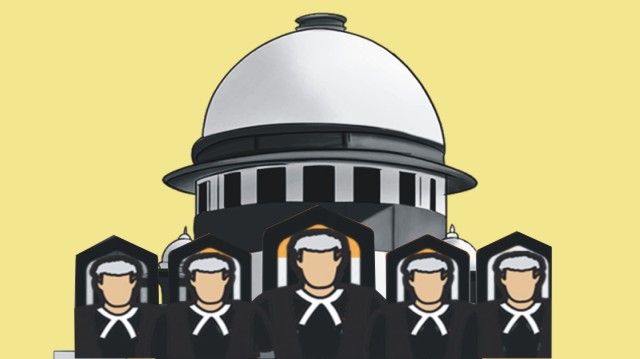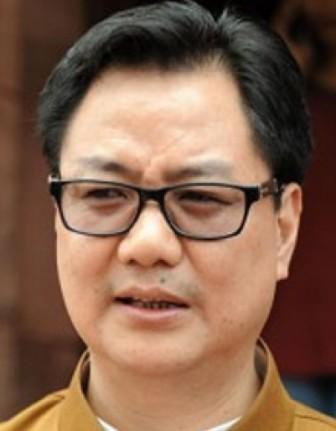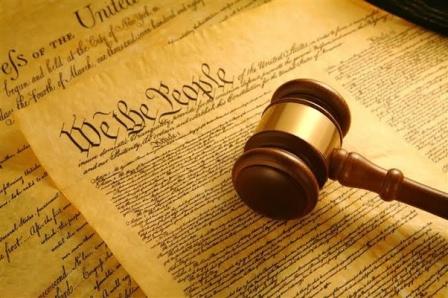

A CONTROVERSY is raging in India over the collegium system for appointment of Supreme Court and High Court judges.
The Union Law Minister, Kiren Rijiju, in several statements has said that the Collegium system is ‘alien’ to the Constitution.

A bench of the Supreme Court has taken exception to the Law Minister’s remarks. Some Opposition politicians have also criticised the Law Minister.
So is the Law Minister wrong? Did he make uncalled for remarks?
I submit that he is absolutely correct and the collegium system of appointing judges is indeed alien to our Constitution. Let me explain.
The method of appointing Supreme Court Judges is given in Article 124(2) of the Constitution which says :
”Every Judge of the Supreme Court shall be appointed by the President by warrant under his hand and seal after consultation with such of the Judges of the Supreme Court and of the High Courts in the States as the President may deem necessary for the purpose and shall hold office until he attains the age of sixty five years: Provided that in the case of appointment of a Judge other than the Chief Justice, the Chief Justice of India shall always be consulted”.
So a judge of the Supreme Court has to be appointed by the President of India (who under our system of governance acts on the advice of the Union Council of Ministers), and the President has to consult such judges of the Supreme Court or High Court as he deems necessary.
President is not bound to consult senior judges of the Court (except that he must consult the Chief Justice of India when appointing a judge other than the CJI). He may consult even junior judges of the Court, or even High Court judges.
Also, he has only to consult, and has not necessarily to take their concurrence.
 But in the second Judges case (Supreme Court Advocates on Record Association vs Union of India, 1993) the Supreme Court held that the President can only appoint a Supreme Court judge on the recommendation of a body called the Collegium consisting of the 3 senior most judges of the Supreme Court.
But in the second Judges case (Supreme Court Advocates on Record Association vs Union of India, 1993) the Supreme Court held that the President can only appoint a Supreme Court judge on the recommendation of a body called the Collegium consisting of the 3 senior most judges of the Supreme Court.
In the third judges case (In re Special Reference 1 of 1998) this number of Collegium judges was expanded to 5. It was also held that the government can once return a recommendation of the Collegium for reconsideration, but if the Collegium reiterates the name the person must be appointed.
Now there is no mention of a collegium in Article 124 of the Constitution. It is a settled principle of interpretation of statutes that Courts cannot in the garb of interpretation amend a statute or substitute it with one of their own creation. Courts are supposed to interpret laws and apply them to cases before them.
 Making law, or amending it, is the job of the legislature. There is broad separation of powers between the 3 organs of the state under our Constitution, and one organ cannot validly encroach into the domain of another (see Divisional Manager, Aravali Golf Club vs Chander Haas).
Making law, or amending it, is the job of the legislature. There is broad separation of powers between the 3 organs of the state under our Constitution, and one organ cannot validly encroach into the domain of another (see Divisional Manager, Aravali Golf Club vs Chander Haas).
But in the second and third judges cases, by what has been called by Lord Cooke as a ‘sleight of hand’, the Supreme Court substituted Article 124(2) of the Constitution by something of their own invention (see Lord Cooke’s article ‘Where Angels fear to tread’ in his book ‘Supreme but not Infallible’).
Justice Krishna Iyer and Justice Ruma Pal, both highly respected former judges of the Supreme Court, have said that Collegium decisions were often reached by ‘trade-offs’, i.e.’ You agree to my man, and I will agree to yours’, which often resulted in undeserving persons being appointed.
In 2014 the 99th Constitutional Amendment sought to replace the collegium system by a National Judicial Appointments Commission, but by a 4-1 majority decision this was struck down by the Supreme Court.
 In this case, Justice Chalameshwar, in a powerful dissent, wrote that there is total lack of accountability and transparency in the collegium system. The system is completely opaque, as no records were maintained as to show what transpired in collegium meetings, so no outsider knows anything.
In this case, Justice Chalameshwar, in a powerful dissent, wrote that there is total lack of accountability and transparency in the collegium system. The system is completely opaque, as no records were maintained as to show what transpired in collegium meetings, so no outsider knows anything.
He also said that there is no mention of any primacy in the Constitution, and the total exclusion of the Govt from the selection process was unknown in the world, apart from being undemocratic. Nowhere in the world except in India do judges appoint judges.
I submit that what the Law Minister has said needs serious consideration, and the second and third judges cases need to be revisited by a larger bench of at least 11 Hon’ble Judges of the Supreme Court (since the Judges cases were decided by 9 member benches). Failure to do so would mean that the present impasse and confrontation will continue, causing further damage to the institution. ![]()
___________
Also Read:
Centre’s Opaque Auction Rules For Pulses Rip Off Govt Coffers, Help Millers Strike Rich
Need to amend laws like UAPA to provide for punishment for those who slap false cases
Global Arms Trade: Who are the real winners?
Why not 40 pc tickets for women in Punjab and elsewhere?
Punjab – How a deadly cocktail of Agri-Water-Energy nexus going to destroy it?
North Pole and the ideological conflict of RSS & Hindutva
Politics of Symbolism: Dalit Chief Ministers in India

Disclaimer : PunjabTodayTV.com and other platforms of the Punjab Today group strive to include views and opinions from across the entire spectrum, but by no means do we agree with everything we publish. Our efforts and editorial choices consistently underscore our authors’ right to the freedom of speech. However, it should be clear to all readers that individual authors are responsible for the information, ideas or opinions in their articles, and very often, these do not reflect the views of PunjabTodayTV.com or other platforms of the group. Punjab Today does not assume any responsibility or liability for the views of authors whose work appears here.
Punjab Today believes in serious, engaging, narrative journalism at a time when mainstream media houses seem to have given up on long-form writing and news television has blurred or altogether erased the lines between news and slapstick entertainment. We at Punjab Today believe that readers such as yourself appreciate cerebral journalism, and would like you to hold us against the best international industry standards. Brickbats are welcome even more than bouquets, though an occasional pat on the back is always encouraging. Good journalism can be a lifeline in these uncertain times worldwide. You can support us in myriad ways. To begin with, by spreading word about us and forwarding this reportage. Stay engaged.
— Team PT


Copyright © Punjab Today TV : All right Reserve 2016 - 2024 |